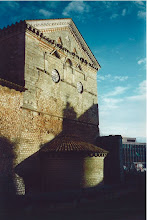Despair not
On Not Measuring One’s Progress
In conclusion, I would like to make one more point concerning the theme of transformation. The Holy Fathers counsel us that we are not to try to measure our spiritual progress. Trying to measure our progress can lead to pride on the one hand, and to despair on the other. If we think, "I’m making great progress, I’m becoming holy," we can be sure that we are not making progress, because we are being prideful, and pride separates us from God. On the other hand, if we despair about what seems to be our lack of progress, this despair also separates us from God.
So, let God do the measuring of our progress. Let God be the judge, both of ourselves and of others.
Benjamin Franklin had the practice of counting up and recording all the good deeds he did every day. From a worldly point of view, this might seem to be a good practice; but this is not what we are to do as Orthodox Christians. We are not supposed to count up our virtues and good deeds and then congratulate ourselves, for Christ said, Let not thy left hand know what thy right hand doeth (Matt. 6:3). In fact, we are supposed to do the opposite: we are to look at our own sins. "Grant me to see my own sins, and not to judge my brother," as we say in the Prayer of St. Ephraim. We need to accuse ourselves of our sins, but we should not judge ourselves in the sense of passing a sentence of condemnation. This is an important distinction. Godly self-accusation leads to taking responsibility for our sins so that we can repent of them, make amends when necessary, and ultimately become free of them. Self-condemnation, on the other hand, leads to despair—because, in passing final judgment on ourselves, we are playing God just as surely as when we pass final judgment on our neighbor.
Spiritual transformation, as we have seen, cannot occur without the Grace of the Holy Spirit. The wind bloweth where it listeth, and thou hearest the sound thereof, but canst not tell whence it cometh, and whither it goeth: so is every one that is born of the Spirit (John 3:8). Transformation by the Grace of God is imperceptible at the time that it occurs. We are being changed, but we do not know it. Therefore, we should not attempt to experience states or moments of transformation. Such an attempt can, after all, only lead to pride and delusion. It is ours only to leave behind all that separates us from God, to turn to God with our whole being, and to let God do the rest.
Spiritual transformation is only perceptible in hindsight. One day we may be able to look back and consider how things have become different. Perhaps we will notice that we are no longer enslaved to a particular passion that once held us tightly. Perhaps, although the circumstances of our lives might be even more difficult than they were in the past, we will notice that we are not reacting to them as negatively as we used to, and that we have a greater sense of trust that our lives are in God’s hands. If we notice such things, let us give thanks to God and not take credit ourselves, remembering the words of St. Diadochos: "Only the Holy Spirit can purify the nous." Then, continuing to practice inner watchfulness, let us look more deeply into ourselves, there to discover more hidden and subtle passions, which we must also put to death on the altar of sacrifice for the sake of Christ.
It is a difficult path, this path of continual re-creation into the likeness of Christ, this path of sacrifice that leads to deification. Our Lord has told us: Narrow is the gate, and difficult is the way, which leadeth unto life (Matt. 7:14). But this is the only way we can follow in order to fulfill the true designation of our existence.
Therefore, following the exhortation of the Apostle Paul, let us not be conformed to this age, let us not follow after the fashions of this world, let us not fashion ourselves according to the passions. Rather, let us be transformed, transfigured into new beings through repentance, through the healing and purification of our nous. Through this transformation, may we come to genuinely love God and our neighbor, may we be united with God through His Grace, and may we dwell forever in perfect love with Christ and His saints. Amen.
- Hieromonk Damascene from a 2005 talk
++++++++++++
As I fall and say to myself Get up! Get up! Keep running! These words are helpful to remind me not to sink into despair, which is deadly. So I'm posting them here for my own archival purposes. The end of the week here has turned out to be hard in the despair department.


3 Comments:
Sometimes, there is a danger in Bright Week to relax too much! Good reminder.
On another note, I nominated you for a Thinking Blogger award.
Well, that's awfully nice - I guess I'm not sure what the 'Thinking Blogger' award is but I'll look it up (I do get accused of thinking too much).
When I read that my mind immediately flashed to the Wizard of Oz quarto:
"If I only had a heart . . .
A brain . . .
A home . . .
The nerve . . ."
[or as the Cowardly Lion says it: "The noyve]
Thanks, M
The noyve
Which is how I say it too, giggle.
Post a Comment
<< Home